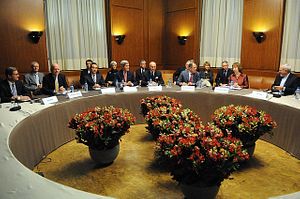Coercing autocrats is a difficult task. The international community has few options short of military force for altering the decision calculi of the world’s strongmen, or convincing them to adopt policies more in line with international norms. Targeted economic sanctions have emerged as a least bad option for confronting misbehaving regimes. However, purposefully creating economic instability through sanctions may have destabilizing second-order effects in seemingly unrelated conflicts.
According to a study by the Peterson Institute for International Economics, sanctions succeed in altering the target regime’s behavior roughly 33 percent of the time. The chances of success increase when sanctions are “targeted,” or directed towards democratic countries.
As such, when analysts and policymakers discuss sanctions policy in relation to Iran and Russia, most of the discussion seeks to determine the optimal scope and scale necessary to make their undesirable policies unbearably costly, without engendering retaliation, or economic consequences that spill over beyond the target state.
For instance, in a piece for the Center for a New American Security, Eric Lorber argues against cutting Russia off from the SWIFT network for facilitating international banking transactions because it would likely “collapse the Russian economy.” As a result, Russia would have a more compelling incentive to invade neighbors for their natural resources, and Western businesses with investment in Russia – or Russian investors – would be harmed.
Lorber continues his critique in a piece for Foreign Affairs, this time in the context of Western sanctions against Iran. Here, his concerns return to the scale and scope debate; for instance, he warns that if policymakers do not signal carefully, sanctions may backfire if target regimes have reason to believe that acquiescing to the sanctioning country’s demands will not lead to sanctions being lifted because of other disputes. This is why Foreign Minister Zarif has emphasized that “All the sanctions must be lifted at once” for Iran to reach an agreement with the U.S.
These are all legitimate concerns. However, the dominant discourse on the second-order effects of sanctions fails to recognize how economic disruption in the target country can destabilize seemingly unrelated conflict resolution processes.
Incidentally, the impact of Western sanctions against Russia on the U.S.-Iranian nuclear negotiations by Western sanctions on Russia provides a paradigm case of this phenomenon. According to The Guardian, Russia has offered to sell Iran Antey-2500 anti-aircraft missiles capable of “intercepting and destroying ballistic and cruise missiles as well as aircraft.”
Analysts claim that the economic dislocation wrought by Western sanctions made Russia more desperate for cash, and less concerned by the impact of their policies on Western security interests. Notably, a proposed 2010 deal to send less sophisticated anti-aircraft missiles to Iran failed when a more conciliatory Dmitry Medvedev responded favorably to Western entreaties. Thus, the economic dislocation wrought by Western sanctions has made Russia more desperate for cash, and less concerned by the impact of its actions on Western security interests.
The missiles would represent a “significant defence against any future airstrikes aimed at Iran’s nuclear facilities,” which would theoretically reduce the incentive for Iran to make concessions in the current round of nuclear negotiations.
It is unclear whether Iran will actually purchase these missiles, or the extent to which Iran’s decision calculus regarding the utility of making the concessions necessary to reach an accord with the West regarding their nuclear program would be altered if did purchase them. It seems unlikely that a marginal improvement in Iran’s ability to fend off an American (or Israeli) attempt to destroy its nuclear facilities (especially in light of the other difficulties inherent in any such effort), would in and of itself radically alter Tehran’s negotiating strategy. However, Iranian hawks who are already skeptical about the deal could point to the missiles as reason for refusing to make large – and likely necessary – concessions by painting the missiles as an “insurance policy” of sorts for failed negotiations.
On the other hand, if Iran does procure the missiles, U.S. and Israeli hawks may pressure policymakers to strike Iranian nuclear facilities before the installation of these missile batteries renders a campaign of airstrikes “riskier and less effective.” Thus, if the sale went through, the negotiations would be undermined as hardliners on both sides appealed to it to justify more hardline policies against the other country.
While sanctions may be the least worst option for countries seeking to change the behavior of hostile regimes, policymakers must recognize that the economic disruption sanctions are intended to cause may undermine conflict resolution processes elsewhere.
Jordan Olmstead is a researcher for the Southwest Initiative for the Study of Middle Eastern Conflicts and a freelance writer. His work focuses on political and security issues in the Middle East and South Asia, with a focus on Iran, Pakistan, and Afghanistan. You can reach him at jchandlerolmstead (at) gmail.com and follow him on Twitter @jcolmstead1.

































